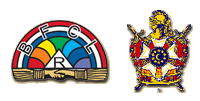M.W. Edward Bailey Rowe 1876-1877
Edward Bailey Rowe
Brother Rowe was born in Utica, New York, September 6, 1834. At an early age he became a resident of Colchester, Conn., where he received his education, graduating from Bacon Academy in that village, preparatory to entering upon a collegiate course, with the view of following a profession, but being inclined to mercantile pursuits, he removed to New London and engaged in the general merchandising business.
In 1856 he went to Muscatine, Iowa, remaining two years, but due to urgent solicitation from his old employer he was persuaded to return to New London, where he entered the old firm as an equal partner.
In 1871 Brother Rowe established a house in Boston and in 1879 associated himself with the New York & New England Railroad as general transfer agent and forwarder.
Brother Rowe was made a Freemason in Union Lodge, No. 31, of New London, Conn., October 11, 1856, having just passed his twenty-second birthday; was elected Secretary, December 16, 1858, and in December, 1865, was elected Worshipful Master, serving one year. In the spring of 1867 he dimitted from Union Lodge and became a charter member of Brainard Lodge, No. 102. In the charter he was nominated as the first Worshipful Master, and continued to serve in the office until 1873.
He was exalted to the Royal Arch degree, in Union Chapter, No.7, November 25, 1862; received in Cushing Council, No.4, and knighted in Palestine Commandery, No.6, April 13, 1864.
He was appointed Deputy Grand Lecturer for the county of New London in 1867 and served two years; also appointed Grand Marshal in 1866. In 1871 he was elected Grand Junior Warden, serving three years; and January 20, 1876, was elected Grand Master, serving two years.
His rare executive ability and magnetic presence, combined with 'l tenacity of purpose, were sources of strength during his .administration, which was very successful and satisfactory. He immediately instituted a system of inspection of the subordinate lodges, being convinced of the advisability of exercising a closer watch and guardianship over them. At the close of his first official year he recommended the appointment of District Deputies, but the Grand Lodge at that time failed to recognize the necessity.
Of The Masonic Charity Foundation of Connecticut he was from its inception one of its most earnest supporters. He became a charter member when it was organized as a corporation, and elected Vice-President and a member of the Board of Managers.
In all his duties he held the esteem and confidence of the Grand Lodge and the Craft in Connecticut. Possessing rare social qualities, a good organizer with keen and quick perception and good judgment ミhe exerted an influence that but few possess. He was chairman of the General Committee to arrange for the Celebration of the Grand Lodge Centennial, where his executive ability found ample scope, resulting in abundant success.
He died in Boston September 1, 1896. His picture appears in the Proceedings of 1891.
